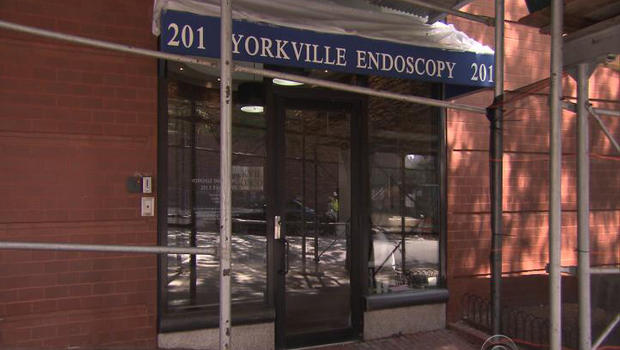Investigation underway at clinic that treated Joan Rivers
NEW YORK - Fans of Joan Rivers continue to leave flowers at her New York City apartment.
The medical examiner said Friday the cause of her death on Thursday has not yet been determined.
The state has begun an investigation at the outpatient clinic here she stopped breathing last week during a medical procedure.
Rivers was at the Yorkville Endoscopy Clinic last week for a procedure involving her vocal cords when she went into cardiac arrest.
The New York State Department of Health declined to provide specifics but says investigators have visited the facility.
In an email, a spokesperson said their inquiries include "document and medical record reviews, observation, and interviews with facility staff, physicians and others as appropriate."
Rivers was at the clinic for an endoscopy, but very little is known about what was done. Normally an evaluation of the vocal cords is done by a specialist different from the one who performs an endoscopy.
In an endoscopy, a fiber-optic camera is inserted into the esophagus, then moved into the stomach and small intestines. The vocal cords can be glimpsed as well.
The procedure is sometimes performed to check for problems of acid reflux, which can contribute to problems with vocal cords.
Yorkville Endoscopy Clinic is an ambulatory surgical center, one of some 120 under New York state regulations. Colonoscopies and endoscopies are some of the procedures performed at these facilities.
Dr. Tara Narula is a cardiologist at Lenox Hill Hospital and a CBS News contributor. We asked her about safety at these surgical outpatient centers.
"Generally, surgical outpatient procedures carry a very low risk. What it's important for people to know is that when you have a cardiac arrest, your risk of surviving that is very low," she said. "If you have a cardiac arrest in the hospital, there's only a 25 percent chance of surviving."
In New York, surgical centers are required to have a cardiac defibrillator on hand, and professionals qualified in resuscitative techniques.
Cardiac or lung complications are rare, involving one death in every 10,000 procedures. Most of those fatalities are from problems with sedation or anesthesia. But it's not know if Rivers had either.
As for how long the investigation will take, a spokesperson for the Department of Health said the lengths vary case by case.
Rivers' funeral is scheduled for Sunday.

